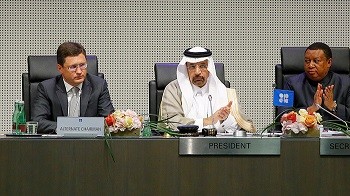Vienna hosted the event expected by the oil market participants – the meeting of OPEC.As a result of this agreement, the expected decision was made to extend the agreement on the reduction of oil production until April next year.The oil ministers of the countries who took part in the discussion on the prolongation of the deal admitted that they have not yet achieved the desired result. Excess oil accumulated in 2014-2016 will remain the same until the end of 2017.Saudi Energy Minister Khalid al-Falikh believes that the oil market will be able to achieve a balance. This will happen no later than March 2018. He believes that in July-September the rate of decline in oil reserves will accelerate. And in the first quarter of next year, reserves will be reduced to an average volume over a five-year period.Nigeria’s Oil Minister Emmanuel Kachikvu believes that the prolongation of the OPEC and non-Cartel producers’ deal will help to keep prices in the world market within the range of $50-60 per barrel.Investors were not satisfied with the decision of OPEC at its meeting in Vienna. They expected more decisive action and additional measures.
OPEC member countries met in Vienna (25.05.2017)
